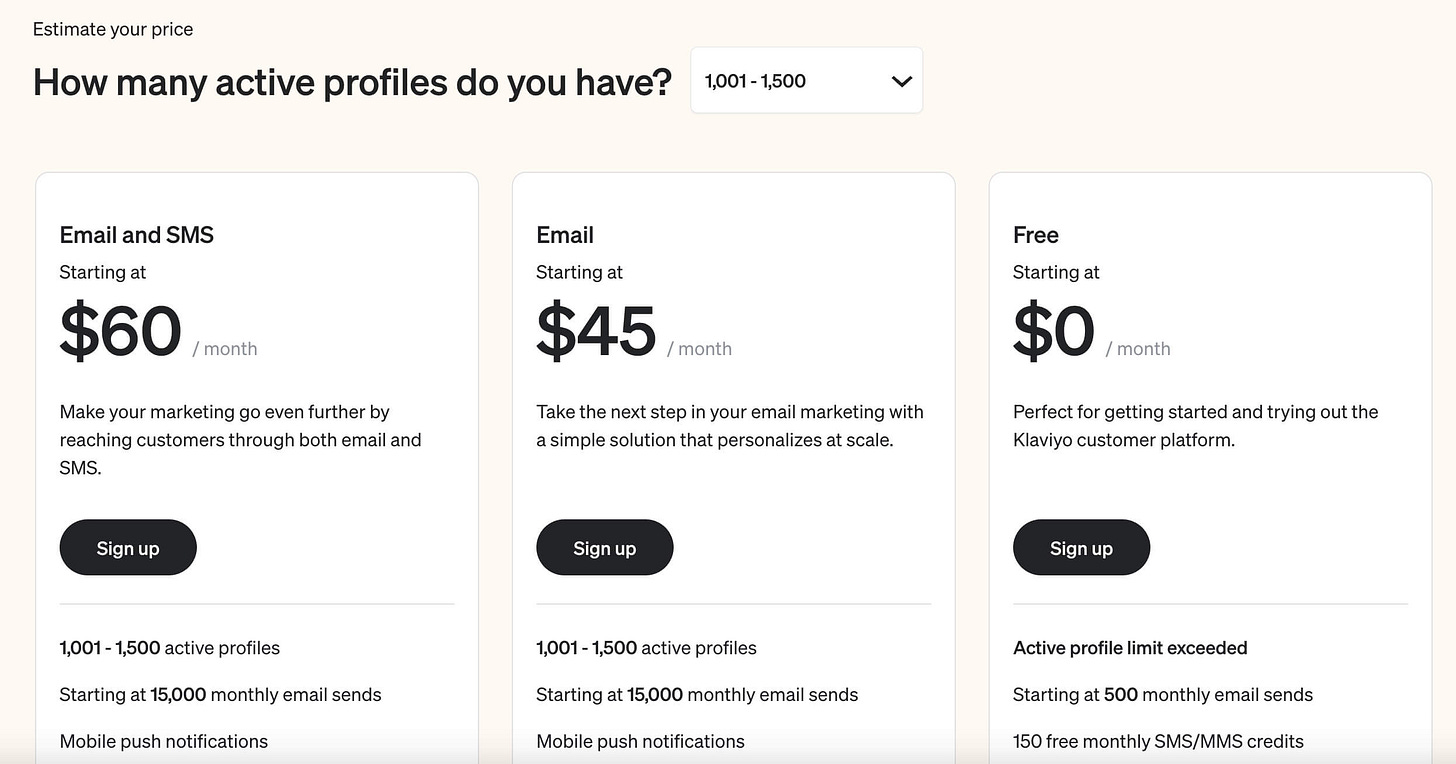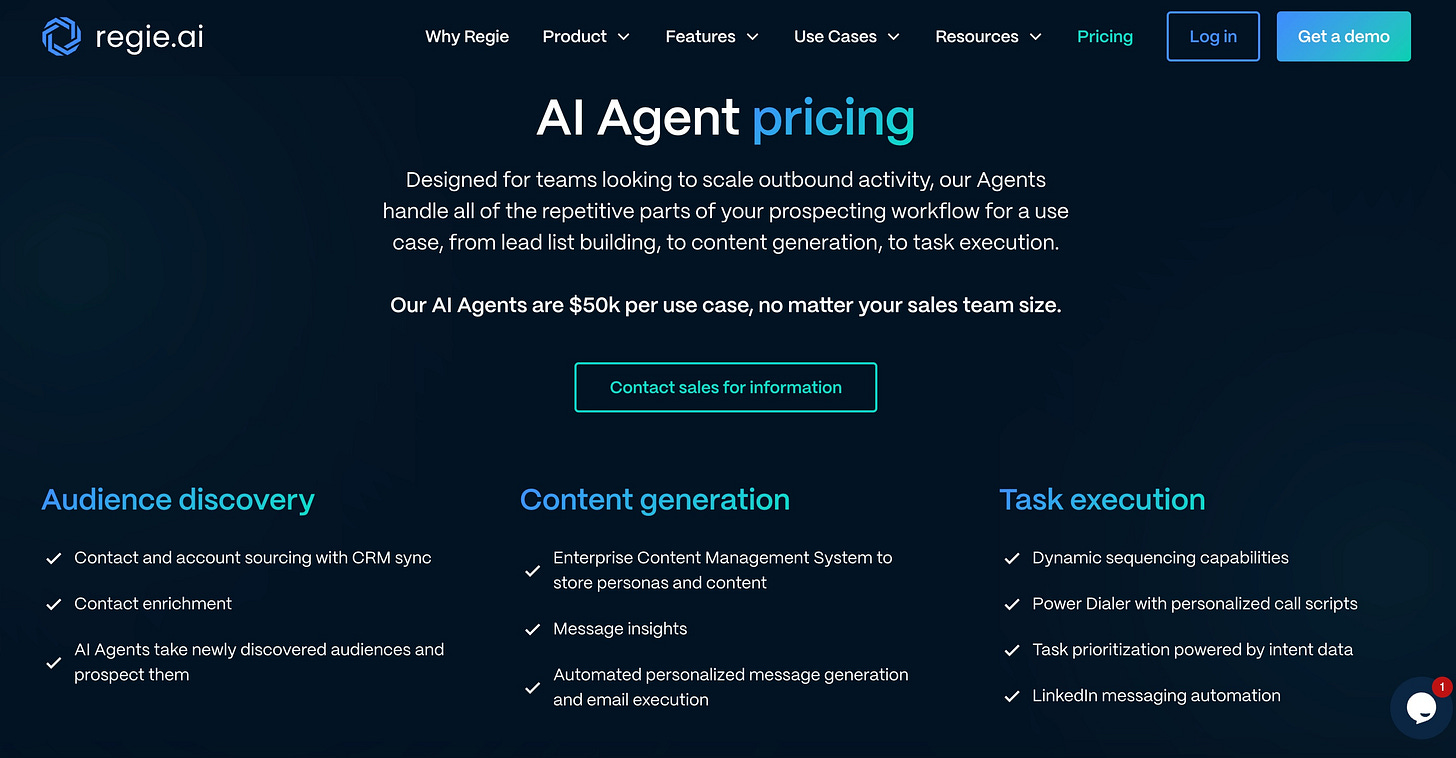Finally, someone is brave enough to take on Calgon detergent
And the hidden price of AI software
Hello Gobbledeers,
How’s it going? If you’re in New York City it’s going hotly.
Today we’re going to talk about:
How to show pricing on your website when you definitely don’t want to show pricing on your website.
A 50 year old commercial for Calgon detergent. Ancient Chinese secret, huh.
Just a friendly reminder that as much as I love writing Gobbledy, I also love running 2-day workshops where we transform your messaging so your prospects actually understand what your product does. If you want to chat about that, I’m at jared@sagelett.com.
The Price Is Right (Here, in tiny font…)
When it comes to pricing pages, you have two options.
You can create a page like this:
Perfectly reasonable. You can choose how big your list is, and it’ll tell you about how much the product will cost. This is good for products that don’t need to be highly configured.
Maybe at some companies there’s a 4th box with the “enterprise” option where you have to “talk to sales” and they don’t show you a price, but you get a sense of the price from the other 3 boxes.
That’s Option 1.
Option 2 is what we see with companies that only sell to large enterprises where the package is highly customized. The pricing page looks like this:
Ha ha, that’s a joke (classic Gobbledy humor!) because they don’t have a pricing page.
But I just learned that there is an Option 3. And I call that option, “Where’s Waldo?”
Because this page looks like Option 2 (which is to say - they’re not going to tell you the price), but it’s actually Option 1 if you look closely enough:
Y’know how you’re constantly having to compromise when you’re working on the website and everyone has an opinion and you have to tell some people they can’t get what they want, and you have to balance it all out to make sure everyone gets something that they want, even if they have to give up other things that they want? And how that approach ensures that nobody is ever happy with the outcome?
Ta-da! This is how you avoid that problem. The “put the price on the page” people and the “don’t put the price on the page” people both get what they want. Excellent work, regie.ai.
Ancient Gobbledy Secret, Huh…
Sometimes you read something and it sort of stops you in your tracks. Not in the way, “Oh my god, I knew that murderer in kindergarten!” More like, “I’m pretty sure you can’t say that anymore.”
Last week we talked about an ad that showed a woman of, let’s say, middle age and then used her as an example of a person in your office who doesn’t know how to use a computer, because they’re an idiot. That was an obvious example of where I was stopped in my tracks because you should not use an image of a woman of middle age to represent a person in your office who is too much of an idiot to use a computer.
Here’s another example:
I was reading this article in the NY Times about companies eliminating college degree requirements, and it quotes Harvard professor Joseph Fuller saying that there’s a big difference between announcing a change in policy, and actually getting frontline managers to implement the policy. Here’s what he said:
“To a frontline manager, choosing the candidate with a college degree could feel like ‘when you’re indifferent between two main dishes at a Chinese restaurant and one comes with free egg rolls.’”
I call this kind of thing “propriate,” in that my first thought was, “that’s inappropriate.” But then I thought, “there’s no reason you can’t say that choosing between two job candidates is like choosing between chicken lo mein and chicken lo mein that comes with a free egg roll” so it’s kind of appropriate. It feels inappropriate but is probably appropriate.
Which is to say, it’s propriate.
All of that made me think about a commercial that first aired in the early 1970s and ran for years without incident, and then collectively we found it a little off-putting (or worse), but now it’s time for a re-consideration. I am, of course, talking about Calgon’s Ancient Chinese Secret ad:
If you haven’t seen that ad (because you’re younger than 47) and you’re too lazy to watch it (can’t blame ya), here’s the short version:
A woman walks into a full-service laundromat and has this conversation with the proprietor:
Woman customer: How do you get your shirts so clean, Mr. Lee?
Mr. Lee: Shhhhh, ancient Chinese secret.
Mr. Lee’s unnamed wife: My husband, some hotshot…here’s his ancient Chinese secret: Calgon.
Voiceover: [Some blah blah blah about how great Calgon is.]
Mr. Lee’s unnamed wife: [Waving a box of Calgon in front of the customer] We need more Calgon.
Woman customer: [mind blown] Ancient Chinese secret, huh?
So I think that in the 1970s this ad likely wasn’t notable at all. The idea that Chinese Americans owned laundromats was rooted in some truth (Chinese Americans DID own many of the laundries, especially on the West Coast, for historical reasons that we can discuss some time when we’re hanging out together in person). Also in the 1970s, nobody cared about anybody’s feelings, viz. their ethnicity (or, really, anything else.)
Then people started to question the whole premise of the ad, with its Chinese laundry and its ancient Chinese secret - it kinda felt gross, and the commercial became lost in the dustbin of culturally inappropriate stuff we used to think wasn’t inappropriate.
But when I went back to watch it a little while ago I was struck by something:
It’s actually about undermining cultural stereotypes and empowering minority groups to use those stereotypes to their own advantage, and also about feminism.
No, really. (Possibly?)
That white woman (let’s call her Karen) walks into the laundry, and I think it’s debatable whether she’s asking Mr. Lee about his laundry prowess because she’s happy with how her clothes turn out or if she’s asking about his laundry prowess because she thinks, “all Chinese people know how to wash clothing.” Like if someone came up to me and said, “Mr. Blank, how did you get so good with money? And also, why is your nose so big?” I mean, maybe I AM good with money and have a big nose, but also maybe that’s not why they’re asking.
Mr. Lee senses an opportunity to keep Karen’s business forever - after all, if the secret to clean clothing is only something Chinese people know, she’s never going to take her filthy clothes and wash them herself. So he makes up some shit about an ancient Chinese secret, and waits to see if she believes him.
And she does! Because maybe she was just a little bit racist in the first place, and she actually DOES assume that all Chinese people learned some secret about how to wash her filthy garments.
Karen’s perfectly satisfied with that explanation. She was ready to take her pile of shmatas, made clean by a 1,500 year old secret from China, and go home.
But no - and this is the real mystery of this commercial:
Why does Mrs. Lee go and ruin the secret? Why does she tell Karen that there’s no secret at all, and that if she just goes and buys some Calgon she, too, can have her clothes equally clean without paying the Lees’ markup?
I’m sure you’ve been wondering this too. (In addition to wondering why I’m writing 1,500 words on a 50 year old commercial…I’m also wondering that).
And I think the answer is in the phrase, “some hotshot.”
She definitely thinks Mr. Lee is flirting with Karen. Maybe this has been an issue in their marriage. I don’t know. Maybe he did hook up with one of their customers, and he used that line about the ancient Chinese secret to lure her into bed. Clearly Mrs. Lee has heard all this nonsense before.
So she has a choice to make - do I support my husband’s desire to make this racist woman think that Chinese people have some special talent for washing towels, or do I undermine him and block any chance he has at, to coin a phrase here, “hand-washing her delicates.” (Or whatever.)
The real story here is that the only character in this three-hander who has a name is Mr. Lee! We never actually hear the names of “Karen” and “Mrs. Lee” - they’re merely pawns in his grand plan to use his ethnicity to bed local white women (white like her sheets after being washed with Calgon!) while keeping his wife in the back room, where she’s not even allowed to go out and buy more detergent without running it by him first.
Mrs. Lee has decided she’s had enough - she’s putting a stop to all this nonsense. She tells Karen that there’s no secret. And if you watch that commercial, Karen is PISSED about this. She really wanted there to be an ancient Chinese secret.
But there was no ancient Chinese secret.
Well, there was, except the secret was that no Chinese wife is going to put up with philandering from her hotshot husband and she doesn’t care if she destroys the entire business to make that happen. Good for you, Mrs. Lee!
I always thank you for reading to the end, but I’ll really really thank you for reading to the end of my sophomore year feminist theory class essay about an old commercial. It felt good to get that off my chest.
If you’d like to chat about ancient ethnic secrets, or how to improve your messaging, I really enjoy spending 30 minutes with my readers. Here’s my Calendly link to set up a chat.




So, book a 2-day workshop, get a 1/2 day lecture on the historical precedent of Chinese-American laundries?